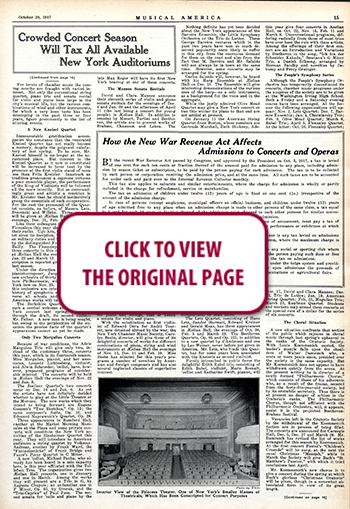 100 YEARS AGO IN MUSICAL AMERICA (212)
100 YEARS AGO IN MUSICAL AMERICA (212)
October 20, 1917
Page 15
How the New War Revenue Act Affects Admissions to Concerts and Operas
BY the recent War Revenue Act passed by Congress, and approved by the President on Oct. 3, 1917, a tax is levied of one cent for each ten cents or fraction thereof of the amount paid for admission to any place, including admission by season ticket or subscription, to be paid by the person paying for such admission. The tax is to be collected by each person or corporation receiving the admission price, and at the same time. All such taxes are to be accounted for under oath and paid over to the Internal Revenue Collector monthly.
This tax also applies to cabarets and similar entertainments, where the charge for admission is wholly or partly included in the charge for refreshment, service or merchandise.
The tax on admission of children under twelve (12) years of age is fixed at one cent (1c.) irrespective of the amount of the admission charge.
In case of persons (except employees, municipal officers on official business, and children under twelve (12) years of age admitted free to any place when an admission charge is made to other persons of the same class, a tax equal to 1 cent for each 10 cents or fraction thereof of the admission price charged to such other persons for similar accommodations must be paid by the persons so admitted free, at the time of such admission.
Persons having the permanent use of boxes in an opera house or in any place of amusement, must pay a tax of ten per cent (10%) of the amount for which a similar box or seat· is sold for the performance or exhibition at which the box or seat is used or reserved by or for such leasee or holder.
No tax is imposed where the maximum charge on admission is five cents (5c.) nor is any tax levied on admissions to out-door general amusement parks or to shows, rides or other amusements therein, where the maximum charge is ten cents (10c.).
A tax of ten per cent (10%) is likewise levied upon initiation fees and dues to any social or sporting club where the dues or fees exceed twelve dollars ($12.) per year. Such tax is to be paid by the person paying such dues or fees and is to be accounted for in the same manner as above outlined with reference to the tax on admissions.
No tax is levied upon dues or fees to fraternal beneficiary societies operating under the lodge system and providing for the payment of life, sick, accident or other benefits to the members, nor upon admissions, the proceeds of which inure exclusively to the benefit of religious, educational or charitable organizations or agricultural fairs.
All these taxes become effective on and after Nov. 1, 1917.




 RENT A PHOTO
RENT A PHOTO





